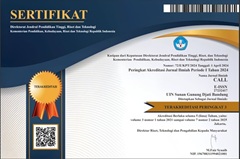EXPRESSIVE SPEECH ACTS ON NETIZENS’ COMMENTS IN JOE BIDEN’S INSTAGRAM ACCOUNT
DOI:
https://doi.org/10.15575/call.v3i2.14446Abstract
United States presidential election 2020 is the most awaited event for the citizens of the United States. People usually want to get to know how good the presidential candidates are by searching for information about the presidential candidates. Checking the presidential candidates’ social media is one way to find outtheirprofiles.Joe Biden as one of the presidential candidates uses the growing popularity of Instagram to gain public attention by posting some of his responses to current issues and promoting himself as the next President of the United States. It made Joe Biden’s Instagram account is filled with netizens’ comments. This research aims to identify the expressive speech acts that appear in Joe Biden's comments published on September 13, 2020, to January 20, 2021, and to describe the reasons for their use of these expressive speech acts. The instrument of this research is a document. The data were collected by browsing the comments on Joe Biden’s Instagram post, then the data were selected, and identified the expressive speech acts used by netizens, then the research showed the findings of the research by presenting data and analysis. There are 26 data contained an expressive speech act, in which 10 data as expressive of thanking, 3data as expressive of congratulating, 5 data as expressive of wishing, 8 data as expressive of attitude. The expressive speech act of thanking is the most dominant type of expressive speech act found on the netizens’ comments of Joe Biden Instagram post. In conclusion, netizens’ comments contained the expressive speech act of thanking since netizens appreciated the good things that Joe Biden had planned when he ran for President of the United States. Joe Biden frequently posts his thoughts on various issues and promises a good solution in the future. Netizens expressed their gratitude for Joe Biden because they felt they had found a leader who cared about society.
Keywords: expressive speech act; instagram; Joe Biden; pragmatics, speech act
References
Austin, J. L. (1962 ). How to Do Things With Words. Oxford: Oxford University.
Clark, H. H. (1996). Using Language. Cambridge: Cambridge University Press.
Creswell, J. W. (2012). Qualitative Inquiry and Research Design: Choosing Among Five Approaches. California: SAGE Publications.
Hornby, A. S. (2000). Oxford University Advanced Learner's Dictionary. Oxford: Oxford University Press.
Levinson, S. C. (1983). Pragmatics. Cambridge: Cambridge University Press.
Ronan, P. (2015). Categorizing Expressive Speech Acts in the Pragmatically. ICAME Journal, 29.
Searle, J. R. (1969). Speech Acts: An Essay in the Philosophy of Language. Cambridge: Cambridge University Press.
__________. (1976). A Classification of Illocutionary Acts. Cambridge: Cambridge University Press.
__________. (1979). Expression and Meaning: Studies in the Theory of Speech Act. Cambridge: Cambridge University Press.
__________. (1980). Speech Act Theory and Pragmatics. London: D. Reidel Publishing Company.
__________. (2005). Expression and Meaning: Studies in the Theory of Speech Acts. Cambridge: Cambridge University Press.
Kurniawan, Sigit, and Hafid Purwono. (2018). Analisis Kebahasaan: Panduan Praktik Analisis Tindak Tutur untuk Pembelajaraan Pengayaan. Sukoharjo: CV Sindunata.
Siregar, D. M. (2018). A Study of Expressive Speech Act Used by The Characters in "Orphan" Movie Script. Medan: University of Sumatera Utara.
Tamam, B. (2020). The Expressive Speech Act Used by Anies Rasyid Baswedan and Recep Tayyip Erdogan as the Reaction of the Attacks in Christchurch New Zealand. Prasasti: Journal of Linguistics, 17.
Yule, G. (1996). Pragmatics. Oxford: Oxford University Press.
Downloads
Published
Issue
Section
Citation Check
License
Authors who publish in CALL agree to the following terms:
- Authors retain copyright and grant the journal right of first publication with the work simultaneously licensed under Attribution-ShareAlike 4.0 International (CC BY-SA 4.0) License that allows others to share the work with an acknowledgment of the work's authorship and initial publication in this journal.
- Authors are able to enter into separate, additional contractual arrangements for the non-exclusive distribution of the journal's published version of the work (e.g., post it to an institutional repository or publish it in a book), with an acknowledgment of its initial publication in this journal.
- Authors are permitted and encouraged to post their work online (e.g., in institutional repositories or on their website) prior to and during the submission process, as it can lead to productive exchanges, as well as earlier and greater citation of published work (See The Effect of Open Access).




